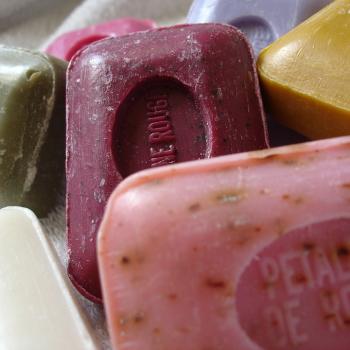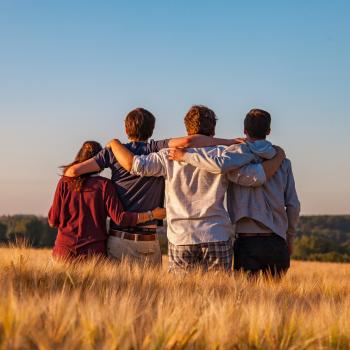The world we live in is a wondrous place. There are majestic waterfalls and snow capped mountain ranges that fill us with a deep sense of awe and inspiration. We experience love and tasty food and human company and all of the sensuous joys that make a life so very precious. And, as the saying goes, rain must fall on every parade at some time. Tragedy and disaster will impact our lives at some point whether it’s affecting us personally or burdening our loved ones.
While there is no magic wand capable of ending all tragedies, there are tools, magical and practical, that we have at our disposal.
Be Prepared For Tragedy & Disaster
Where do you live and what’s the most likely natural disaster to occur in your area? The Red Cross and other disaster relief agencies always recommend having some sort of “Go Bag” or week long emergency kit on hand. A “Go Bag” could be a backpack, a bucket, or a paper bag. It isn’t important what it is, but it is critical to have one. Pack a basic first aid kit and include any medicines that you need to survive, like epipens or insulin. Make sure you have non perishable foods that are quick to prepare like Ramen noodles or high calorie pre-prepared camping meals. It’s important to have water supplies too, so add those to your kit. Ideally, you’ll want an extra set of clothes in there and basic hygiene items.
If a natural or human-made disaster hits your area, what’s your evacuation route? If you rely on public transport, are their folks in your network that could pick you up or get you out of the area? Do you have spare gasoline, cash or a bike ready to go? Groups like FEMA have terrific resources, tips, and guides with all sorts of useful information.

Know Your Community Resources
I’m pretty fortunate. If a tragedy occurred I could pick up the phone or go online and reach out to a whole community of people that would help me somehow. In the depths of a horrible depression, barely able to function, and questioning my very existence, I had folks that checked in with me, called me, made sure I was as okay as I could be in that particular moment. If I needed a place a stay for a few days or a few months, I have folks that could accommodate me. Beyond friends and loved ones that could help, there are community resources too. For instance, I know where the Red Cross would set up shelters if there was a natural disaster.
The shop I co-own is well known to folks in the local LGBTQ and magical communities as a safe space. If they are threatened or unsafe they can come to us as a place of temporary sanctuary and trust that we’ll help get the immediate resources they need. Are there community resources and safe spaces near you? What resources might you need in a personal tragedy? The more you know and the better you can communicate your plans and needs to others, the more likely you are to get through whatever it is you’re going through.
Avoid Becoming Overwhelmed
This is a big one to deal with. Spend any amount of time online and you’ll find countless overwhelming situations. There will always be floods and fires and hunger and violence and, well the list goes on and on. Just reading that last sentence probably made your blood pressure spike. There are myriad studies showing that immersion in “bad news” from social media resources contributes to feelings of isolation, depression and hopelessness. The internet is an incredible resource and lifeline to a larger world. The other side of the “internet” coin is that our ability to become overwhelmed by toxic information is right in our hands.
A CBS news report noted “if we are what we eat, we may also be what we consume through our eyes and ears. Watching and reading reports of violence and tragedy seem to promote anxiety and depression, according to recent research from Scandinavia. Does that suggest we should bury our heads in the sand? No. But especially when you’re experiencing hard times, make sure you pay attention to what you’re watching and hearing news-wise.”
Being prepared and knowing where your resources are won’t make the disaster or tragedy any less overwhelming, but knowing that your basic survival needs are taken care of can ease your mind. And having a clear mind in a time of tragedy is critically important to survival.
Doing The One Thing You Can
A mentor of mine, Gerri Ravyn Stanfield, once asked me to name all of the problems I saw in the world. There was a long list. I’m sure you would come up with a seemingly endless list too. The point they were making is that I could spend my whole life spinning from one problem to the next, always finding another situation that was hopeless or too big to solve. There are always traumatic occurrences happening. Ravyn asked me to identify the problem or cause I was most passionate about and challenged me to “find the one thing you can do today that would make a difference”. I can’t solve the problems of the world, no matter how much I want to but I can take small steps every day.
So what step can you take today in preparation for some future disaster or tragedy? Can you get life insurance? Do you have a will? Can you set up a phone or email tree or download a check in app?
Getting Through It Not Over it
Whether your tragedy is a break up, a death, or losses due to a natural disaster it’s unlikely that you’ll ever “get over it”. That’s a tough pill to swallow but it’s a real truth. The wounds from those horrible experiences rarely, if ever go away. We cry, we sit in utter disbelief, we yell at the godds* or the Universe or our parents or the government or that asshole partner until we can’t yell anymore. And then, if we’re lucky we begin to get through it.
This is another place where connection can be so beneficial. Who in your network of friends, colleagues, co-conspirators or co-religionists is a grief counselor or an attorney or a cancer survivor or an insurance agent or a priestess/priest/minister? Who can sit with you and help you make sense of your situation in a compassionate, logical, way? Who are the experts in your life?
Remember there’s no expiration date on grief and trauma, but in most cases, the pain and immediate triggered responses will lessen. Having some one, some group to process the situation is crucial part of moving through.

Rituals And Magic
Most magical people I know participate in rituals. Rituals help us heal and give us a place to pour our grief, our trauma, and our feelings of “what the ever loving fuck is happening right now?” Creating a ritual or asking your community of magic workers to hold a ritual for you is an important tool. A recent article titled “Why Rituals Work” from Scientific American noted “people who wrote about engaging in a ritual reported feeling less grief than did those who only wrote about the loss.”
Spell work, healing rituals, grief magic are all effective ways of dealing with tragedy and disaster and the broader Pagan community has a wealth of ritual resources. If you are a solitary witch, do you know other solitaries that could help you write a ritual? If you are in a coven or magical group, is there space to do personal work just for you? Are there community rituals happening in your area?
Pray to your godds, light the candles, shake the rattles, and keen loudly. Do all of the ritual things you can imagine. It helps, it really does.
As the saying goes, “an ounce of prevention is worth more than a pound of cure.” May you and tragedy be distant cousins, and when and if those cousins come to stay, may you prepared!












